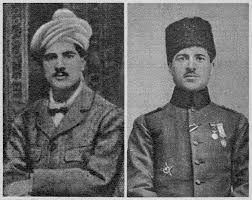Muhammad Fahim
Journalist
As his name suggests, Abdur Rahman Peshawari also known as Abdurrahman Bey was born in an affluent Samdani family in Peshawar, capital of Khyber-Pakhtunkhwa province of Pakistan, in 1886. His father’s name was Haji Ghulam Samdani. He was a Pashtun and Kashmiri origin Turkish soldier, journalist and a diplomat. The great Abdur Rahman received his early education in his hometown, Peshawar, and went to Aligarh Muslim University for higher education. Later during the Balkan war, he abandoned his higher education and went to Istanbul as a volunteer medic to aid the Ottoman soldiers in 1912. His entire group of doctors and nurses returned to British India except the great Abdur Rahman Peshawari. Peshawari decided to stay and enlisted himself in the Ottoman army. He fought the WWI and the Turkish war of independence as an Ottoman soldier. This great man and the pride of Pashtun nation had also worked as one of the first journalists in the Anadolu News Agency. Moreover, after the Turkish war of independence that he fought under the leadership of Mustafa Kamal Ataturk, he was appointed as the first ambassador of Turkey to Afghanistan in 1920.
“Abdur Rahaman earned the sobriquet of Lala Turkey”, his nephew noted during his interview with Anadolu News Agency – Peshawari once worked for. In the Pashto language, the Lala word refers to elder brother.
The great Turkish leader and the incumbent President of Turkey, Recep Tayyip Erdogan, always reminded the Pakistani nation of this unsung hero in almost all his pressers, meetings with Pakistani leadership and his speeches to the joint sessions of Pakistani Parliament. Very few in Pakistan know about Peshawari and his legendary character. However, he is revered and remembered with great respect in the land of the braves, Turkey. His mother pleads him to return home but he argued in his letter to his mother that he cannot abandon his Muslim brothers (Turks) in a midst of Allied invasion. Moreover, during his two-year service as Turkey’s ambassador to Afghanistan, he declined the then British Empire offer to return back home by arguing that he will never return to occupied land. Thus, he never returned to his hometown.
The medical mission he voyaged with to Istanbul at the age of 26 was spearheaded by Dr. Mukhtar Ahmad Ansari comprising twenty-four doctors and nurses. He was trained by doctors as male nurses during their sea journey from Mumbai to Istanbul. Though he belonged to an affluent and prominent family of Peshawar, however, he was not sure whether his father would fund his voyage to Istanbul or not, thus he sold all his belongings at the Aligarh Muslim University to finance his endeavors.
Upon the end of the Balkans war in 1913, his medical team returned home but Peshawari decided to stay with his Turkish Muslim brothers. Later, he enlisted himself in the Ottoman Army. He received his training as a lieutenant in the Ottoman army in Istanbul. Before the commencement of the great World War 1, he was deployed to Beirut. Furthermore, during his service, he sustained several injuries in the battle field while fighting the Royal British Army in WWI. However, this lion of Peshawar fought like a legend and commanded a military contingent from the front. The lion of Peshawar, Lala Turkey, was also a part of the Gallipoli campaign where they defeated the Allied forces.
Lala also fought the Turkish War of Independence under the leadership of Mustafa Kamal Ataturk.
Concerning his death, he was assassinated at a young age. Because of Lala’s stark resemblance with a prominent Turkish politician, Rauf Bay, Lala was gun downed by an assassin who mistook him as Rauf Bay. He succumbed to his wounds a month later. Lala is buried in the Macka graveyard in Istanbul, Turkey.

